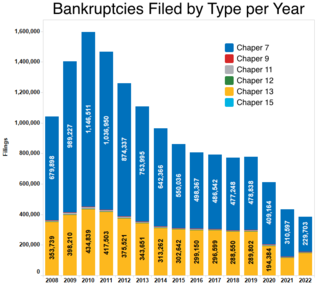Bankruptcy is a legal process through which people or other entities who cannot repay debts to creditors may seek relief from some or all of their debts. In most jurisdictions, bankruptcy is imposed by a court order, often initiated by the debtor.
Chapter 7 of Title 11 U.S. Code is the bankruptcy code that governs the process of liquidation under the bankruptcy laws of the U.S. In contrast to bankruptcy under Chapter 11 and Chapter 13, which govern the process of reorganization of a debtor, Chapter 7 bankruptcy is the most common form of bankruptcy in the U.S.
Title 11 of the United States Code sets forth the statutes governing the various types of relief for bankruptcy in the United States. Chapter 13 of the United States Bankruptcy Code provides an individual with the opportunity to propose a plan of reorganization to reorganize their financial affairs while under the bankruptcy court's protection. The purpose of chapter 13 is to enable an individual with a regular source of income to propose a chapter 13 plan that provides for their various classes of creditors. Under chapter 13, the Bankruptcy Court has the power to approve a chapter 13 plan without the approval of creditors as long as it meets the statutory requirements under chapter 13. Chapter 13 plans are usually three to five years in length and may not exceed five years. Chapter 13 is in contrast to the purpose of Chapter 7, which does not provide for a plan of reorganization, but provides for the discharge of certain debt and the liquidation of non-exempt property. A Chapter 13 plan may be looked at as a form of debt consolidation, but a Chapter 13 allows a person to achieve much more than simply consolidating his or her unsecured debt such as credit cards and personal loans. A chapter 13 plan may provide for the four general categories of debt: priority claims, secured claims, priority unsecured claims, and general unsecured claims. Chapter 13 plans are often used to cure arrearages on a mortgage, avoid "underwater" junior mortgages or other liens, pay back taxes over time, or partially repay general unsecured debt. In recent years, some bankruptcy courts have allowed Chapter 13 to be used as a platform to expedite a mortgage modification application.
A creditor or lender is a party that has a claim on the services of a second party. It is a person or institution to whom money is owed. The first party, in general, has provided some property or service to the second party under the assumption that the second party will return an equivalent property and service. The second party is frequently called a debtor or borrower. The first party is called the creditor, which is the lender of property, service, or money.

A debtors' prison is a prison for people who are unable to pay debt. Until the mid-19th century, debtors' prisons were a common way to deal with unpaid debt in Western Europe. Destitute people who were unable to pay a court-ordered judgment would be incarcerated in these prisons until they had worked off their debt via labour or secured outside funds to pay the balance. The product of their labour went towards both the costs of their incarceration and their accrued debt. Increasing access and lenience throughout the history of bankruptcy law have made prison terms for unaggravated indigence obsolete over most of the world.
In financial and legal usage, defalcation may involve misappropriation of funds by a person trusted with their charge; also, the act of misappropriation, or an instance thereof. A common example of defalcation would be skimming.

In the United States, bankruptcy is largely governed by federal law, commonly referred to as the "Bankruptcy Code" ("Code"). The United States Constitution authorizes Congress to enact "uniform Laws on the subject of Bankruptcies throughout the United States". Congress has exercised this authority several times since 1801, including through adoption of the Bankruptcy Reform Act of 1978, as amended, codified in Title 11 of the United States Code and the Bankruptcy Abuse Prevention and Consumer Protection Act of 2005 (BAPCPA).
A guarantee is a form of transaction in which one person, to obtain some trust, confidence or credit for another, agrees to be answerable for them. It may also designate a treaty through which claims, rights or possessions are secured. It is to be differentiated from the colloquial "personal guarantee" in that a guarantee is a legal concept which produces an economic effect. A personal guarantee, by contrast, is often used to refer to a promise made by an individual which is supported by, or assured through, the word of the individual. In the same way, a guarantee produces a legal effect wherein one party affirms the promise of another by promising to themselves pay if default occurs.

Debt collection or cash collection is the process of pursuing payments of money or other agreed-upon value owed to a creditor. The debtors may be individuals or businesses. An organization that specializes in debt collection is known as a collection agency or debt collector. Most collection agencies operate as agents of creditors and collect debts for a fee or percentage of the total amount owed. Historically, debtors could face debt slavery, debtor's prison, or coercive collection methods. In the 21st century in many countries, legislation regulates debt collectors, and limits harassment and practices deemed unfair.
A bankruptcy discharge is a court order that releases an individual or business from specific debts and obligations they owe to creditors. In other words, it's a legal process that eliminates the debtor's liability to pay certain types of debts they owe before filing the bankruptcy case.
Bankruptcy in the United Kingdom is divided into separate local regimes for England and Wales, for Northern Ireland, and for Scotland. There is also a UK insolvency law which applies across the United Kingdom, since bankruptcy refers only to insolvency of individuals and partnerships. Other procedures, for example administration and liquidation, apply to insolvent companies. However, the term 'bankruptcy' is often used when referring to insolvent companies in the general media.
A charging order, in English law, is an order obtained from a court or judge by a judgment creditor, by which the property of the judgment debtor in any stocks or funds or shares in a limited liability company or land stands charged with the payment of the amount for which judgment shall have been recovered, with interest and costs.

The Bankruptcy and Insolvency Act is one of the statutes that regulates the law on bankruptcy and insolvency in Canada. It governs bankruptcies, consumer and commercial proposals, and receiverships in Canada.
An individual voluntary arrangement (IVA) is a formal alternative in England and Wales for individuals wishing to avoid bankruptcy. In Scotland, the equivalent statutory debt solution is known as a protected trust deed.
Bankruptcy is a legally declared inability or impairment of ability of an individual or organization to pay their creditors. In most cases personal bankruptcy is initiated by the bankrupt individual. Bankruptcy is a legal process that discharges most debts, but has the disadvantage of making it more difficult for an individual to borrow in the future. To avoid the negative impacts of personal bankruptcy, individuals in debt have a number of bankruptcy alternatives.
Bankruptcy in Irish Law is a legal process, supervised by the High Court whereby the assets of a personal debtor are realised and distributed amongst his or her creditors in cases where the debtor is unable or unwilling to pay his debts.
Civil procedure in South Africa is the formal rules and standards that courts follow in that country when adjudicating civil suits. The legal realm is divided broadly into substantive and procedural law. Substantive law is that law which defines the contents of rights and obligations between legal subjects; procedural law regulates how those rights and obligations are enforced. These rules govern how a lawsuit or case may be commenced, and what kind of service of process is required, along with the types of pleadings or statements of case, motions or applications, and orders allowed in civil cases, the timing and manner of depositions and discovery or disclosure, the conduct of trials, the process for judgment, various available remedies, and how the courts and clerks are to function.
Insolvency in South African law refers to a status of diminished legal capacity imposed by the courts on persons who are unable to pay their debts, or whose liabilities exceed their assets. The insolvent's diminished legal capacity entails deprivation of certain of his important legal capacities and rights, in the interests of protecting other persons, primarily the general body of existing creditors, but also prospective creditors. Insolvency is also of benefit to the insolvent, in that it grants him relief in certain respects.

Cayman Islands bankruptcy law is principally codified in five statutes and statutory instruments:
Anguillan bankruptcy law regulates the position of individuals and companies who are unable to meet their financial obligations.





